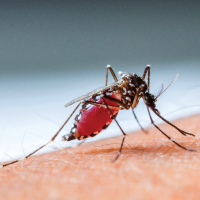Is Zika a real threat to Australia’s blood supply, or is media coverage obscuring the facts?
Zika is a mosquito-borne virus closely related to dengue virus that, since its identification in 1947, has until recently flown under the radar. However, Zika hit international news in February as a World Health Organisation-declared ‘Public Health Emergency’ due to large outbreaks in several countries and recent unconfirmed claims that it causes birth defects.
Zika virus can be found in animals and exists in many parts of Asia and Africa, often without any human outbreaks. However, between 2013 and 2015 there were outbreaks of Zika in a number of Pacific countries, and in 2015 and 2016, large outbreaks occurred and are ongoing in several countries in Central and South America.
The virus itself is rarely harmful and only one person in five will display symptoms— including fever, pain and swelling around the joints, muscle pain, headache, skin rash, conjunctivitis and fatigue. Patients with Zika rarely require hospitalisation.
The reason for the concern now is information from some recent outbreaks, particularly in Brazil, raising concerns about whether Zika virus infection in pregnant women may cause birth defects, in particular microcephaly (an abnormally small head). An increased incidence of Guillain-Barré Syndrome, a rare neurological condition that causes paralysis has also been reported in adults following Zika virus infection. The evidence that Zika virus is causing these rare severe outcomes has increased significantly recently, and is accumulating.
Although there are preliminary reports that Zika virus has been transmitted by blood transfusion, evidence so far indicates that it’s only present in the blood for a very brief period.
So, should the health industry be concerned about potential future effects of Zika on Australia’s blood supply? According to Tony Keller, Blood Service National Donor and Product Safety Specialist, the answer is no. As he explained: “As with other mosquito-borne viruses, the Blood Service has comprehensive systems in place to prevent transmission by transfusion. At the Blood Service we’re alert, but not alarmed, about Zika.”
This is for several reasons. Firstly, as of 15 March 2016, only 39 cases of Zika virus have ever been reported in Australia, and all from travellers who were infected while abroad. All of the countries currently affected by Zika outbreaks are already covered by the Blood Service’s travel deferrals, which stop donors who have travelled to countries with dengue, chikungunya and malaria risks from donating for a minimum of four weeks and up to four months. As the Zika incubation period (the time from when a person contracts the virus until they develop symptoms) is typically 3–12 days and the duration of the virus in the blood is brief, anyone who returns with Zika will have the virus well out of their system by the time they’re eligible to give blood. Also, anyone who has been diagnosed with Zika must wait at least four weeks after they’ve completely recovered before they can donate.
Secondly, only a certain type of mosquito can actually spread Zika virus: Aedes aegypti. In Australia, these mosquitoes are only found in parts of northern Queensland. Sexual transmission has been reported in a limited number of cases—and as a precaution we have also introduced a temporary blood donor deferral for sexual contact with anyone who has Zika virus—but, as of 15 March 2016, there hasn’t been a locally acquired case of Zika in Australia.
Thirdly, the risk of a large outbreak here compared to developing nations such as Brazil is far lower, given the limited area of potential spread in Australia and our current systems for managing mosquito-spread viruses. To manage the small area populated by the Aedes aeqypti mosquito, the Blood Service currently has an arrangement in place with the Queensland government similar to that for dengue, where any locally acquired cases trigger an immediate review and deferral of blood donors who travelled to the area during the outbreak.
“Before these outbreaks made the news the Blood Service was involved in a number of research projects focused on Zika virus and blood transfusion,” explained Tony, “and our current risk management strategies have reduced the already very low risk of transmission by transfusion to negligible.”
“We’re monitoring the situation closely and will keep customers and stakeholders updated if anything changes.”

